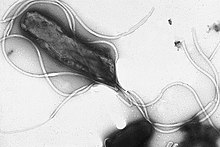
Estimates place the worldwide risk of cancers from infectious causes at 16.1%.[1] Viral infections are risk factors for cervical cancer, 80% of liver cancers, and 15–20% of the other cancers.[2] This proportion varies in different regions of the world from a high of 32.7% in Sub-Saharan Africa to 3.3% in Australia and New Zealand.[1]
A virus that can cause cancer is called an oncovirus or tumor virus. These include the human papillomavirus, which is associated with cervical carcinoma and nasopharyngeal carcinoma; Epstein-Barr virus, which is associated with a variety of Epstein-Barr virus-associated lymphoproliferative lymphomas; Kaposi's sarcoma herpesvirus, which is associated with Kaposi's sarcoma and primary effusion lymphoma; hepatitis B and hepatitis C viruses which are associated with hepatocellular carcinoma; human T-cell leukemia virus-1, which is associated with adult T-cell leukemia/lymphoma; and bovine leukemia virus, which is associated with breast cancer.[3] Bacterial infection may also increase the risk of cancer, as seen in Helicobacter pylori-induced stomach cancer.[4] Parasitic infections strongly associated with cancer include Schistosoma haematobium (squamous cell carcinoma of the bladder) and the liver flukes, Opisthorchis viverrini and Clonorchis sinensis (cholangiocarcinoma).[5]
- ^ a b de Martel C, Ferlay J, Franceschi S, Vignat J, Bray F, Forman D, Plummer M (June 2012). "Global burden of cancers attributable to infections in 2008: a review and synthetic analysis". The Lancet. Oncology. 13 (6): 607–15. doi:10.1016/S1470-2045(12)70137-7. PMID 22575588.
- ^ De Paoli P, Carbone A (October 2013). "Carcinogenic viruses and solid cancers without sufficient evidence of causal association". International Journal of Cancer. 133 (7): 1517–29. doi:10.1002/ijc.27995. PMID 23280523. S2CID 38402898.
- ^ Buehring GC, Sans HM (December 2019). "Breast Cancer Gone Viral? Review of Possible Role of Bovine Leukemia Virus in Breast Cancer, and Related Opportunities for Cancer Prevention". International Journal of Environmental Research and Public Health. 17 (1): 209. doi:10.3390/ijerph17010209. PMC 6982050. PMID 31892207.
- ^ Pagano JS, Blaser M, Buendia MA, Damania B, Khalili K, Raab-Traub N, Roizman B (December 2004). "Infectious agents and cancer: criteria for a causal relation". Seminars in Cancer Biology. 14 (6): 453–71. doi:10.1016/j.semcancer.2004.06.009. PMID 15489139.
- ^ Samaras V, Rafailidis PI, Mourtzoukou EG, Peppas G, Falagas ME (June 2010). "Chronic bacterial and parasitic infections and cancer: a review". Journal of Infection in Developing Countries. 4 (5): 267–81. doi:10.3855/jidc.819. PMID 20539059.